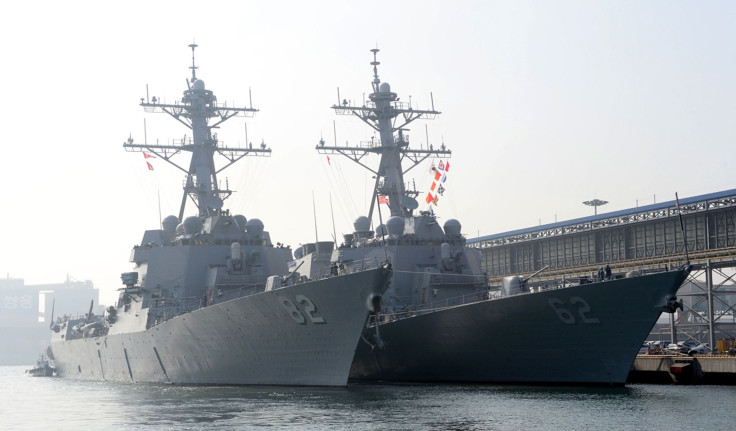North Korea Hacks Sony: US Military Building Pacific Navy Fleet; 'We Have To Be Prepared'

A week before U.S. officials officially fingered North Korea Friday as being responsible for the damaging cyberattack on Sony Pictures Entertainment, military leaders warned about potential dangers in the region and vowed to "deter" Pyongyang. The Obama administration has been studying North Korea's involvement in the attacks for weeks, and the secretary of the Navy outlined plans last week to beef up America’s fleet in the Pacific.
"There will be more ships in this region to do exercises to hopefully deter any sort of actions and to make sure that we are ready for working with” South Korea, U.S. Secretary of the Navy Ray Mabus told the Yonhap news agency. “We will be a fleet of more than 300 ships by the end of this decade, and 60 percent of those ships will be in the Pacific region. We are 50 percent now, and we are shifting our most modern platforms here.”
There are currently 17 ships based at two Japanese ports out of 87 that are part of the U.S.’ Pacific fleet, according to the Navy website. The rest are based in Hawaii, Washington State, California and Bahrain in the Middle East.
It's unclear if the ongoing military buildup is related to the Sony hack. North Korea has repeatedly threatened the U.S., and its third nuclear test in early 2013 led President Barack Obama to warn in April that "we will not hesitate to use our military might to defend our allies and our way of life," according to Reuters. The Defense Department's latest annual report warned that the North "could conduct additional nuclear tests at any time."
Mabus, however, noted the Obama administration wants a "rebalance toward the Pacific." "One of the things I am proud of is we are growing our fleet. We are growing not only the numbers, but the capabilities of our fleet,” Mabus said, according to the Korea Herald. He added that the U.S. was worried that North Korea “will take some provocative actions that will allow the situation to get out of control.”
Adm. Harry Harris, commander of the U.S. Pacific Fleet, said during his confirmation hearing earlier this month that North Korea was America’s “most volatile and dangerous threat” because of “its quest for nuclear weapons and the means to deliver them intercontinentally." If the U.S. didn’t increase its presence in the Pacific, North Korea would seize an opportunity to prey on weakness, he said, calling North Korea's Kim Jong Un “a very opportunistic and very unpredictable and ruthless leader.”
As the cyberattacks on Sony were ongoing, Harris alluded to North Korea’s use of hackers, saying the isolated country “is seeking asymmetrical advantages over us and our allies in the Pacific," according to Bloomberg.
Mabus also warned about North Korea’s missile capabilities. “Any sort of ballistic missile threat or capability of North Korea is potentially very dangerous. I think regardless of where they originate, we have to be prepared,” he said.
The Sony cyberattack began Nov. 24, when hackers disabled the entertainment company's computer systems, according to the Los Angeles Times. Embarrassing, racist emails by Sony Pictures co-chair Amy Pascal were later leaked that invoked Obama. “The Interview,” the film starring Seth Rogen and James Franco that centers on a plot to assassinate Kim, was yanked from its Christmas release this week amid a threat from the hackers to Sony and movie theaters that alluded to a Sept. 11-style attack.
© Copyright IBTimes 2024. All rights reserved.












